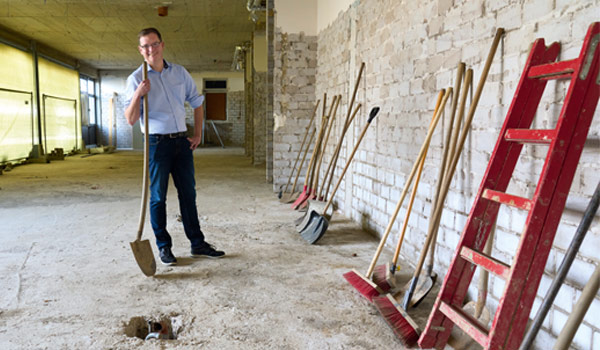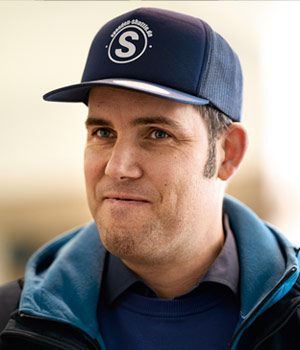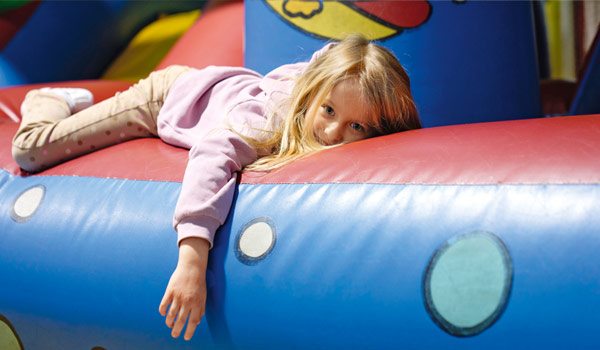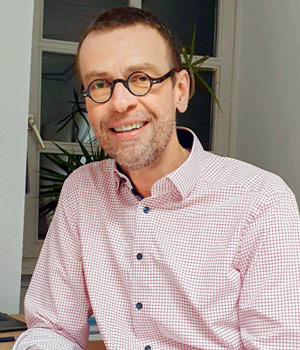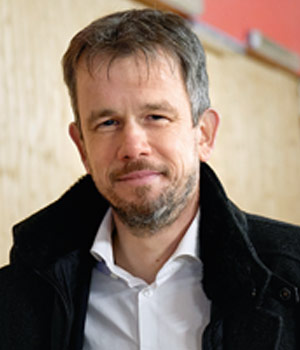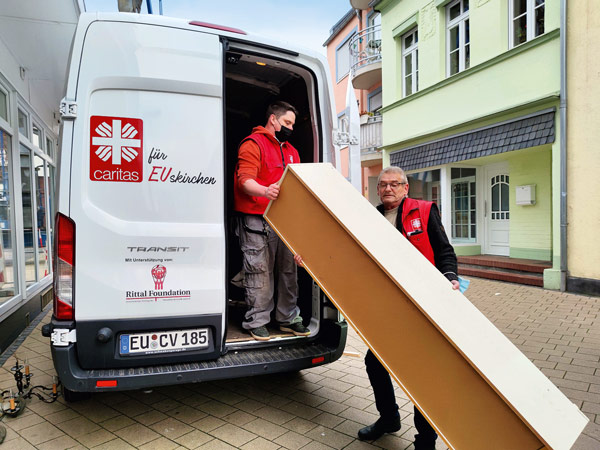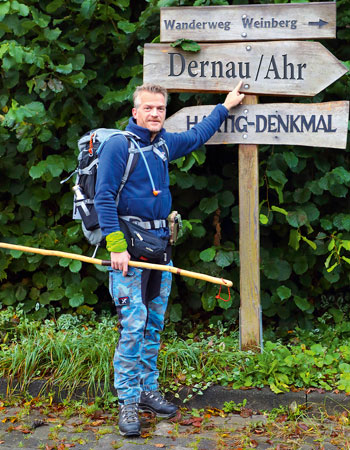Text Peter Nederstigt ––– Photography
It is now a good nine months since the disastrous flooding of the summer of 2021. Still, I don’t think we will ever get those images out of our heads. The floods in the Ahr valley and parts of North Rhine-Westphalia cost 184 people their lives. Thousands more lost their homes from one day to the next. The Münchener Rück insurance company estimates that 33 billion euros of damage was caused in Germany alone. It will take years to make good the material damage caused by the 100-year flood. It was a catastrophe the likes of which our country hadn’t seen for 60 years – not since the storm surge of 1962 in Hamburg.
In the summer of 2021, the images and reports showing the suffering of the people affected triggered an unprecedented outpouring of support. Within the space of just a few weeks, the employees of the Friedhelm Loh Group and their owner, Prof. Friedhelm Loh, also raised 930,000 euros for the flood victims. The Rittal Foundation was tasked with distributing the donations, supporting projects in the three areas of education, church-based welfare work/social responsibility, and culture and science.
By the end of February, the Foundation had paid out around two-thirds of the funds to initiatives in the affected areas. “Our goal was to provide aid quickly to places where it could be used immediately, while still improving the situation for the long term. To this end, we maintained close contact with victims and initiatives in the affected area from the start,” says Rainer Reissner, who has been Managing Director of the Rittal Foundation since autumn 2021. Together with Friedemann Hensgen, the former Chairman of the Foundation, Reissner visited some of the initiatives in the Ahr valley and Euskirchen that had received support from Rittal, including the Boeselager Realschule. The two men were keen to see first-hand how the aid they had provided had been put to use and where there might be a need for further support.
Among the aid workers they met on their trip was Guido Henseler, Chairman of Spenden-Shuttle. Although he was barely affected by the flood personally, the father of three has been helping the victims of the flood any way he can ever since. In Dernau and other affected communities in the Ahr Valley, the hydraulic engineering expert started by establishing a temporary drinking water supply system. Henseler even took out a loan of 50,000 euros before a friend collected 130,000 euros in donations for his work.
“That’s when I realised helping out was a lot of fun!” That’s what he told his two visitors in mid-February. They were standing together in a large tent on the banks of the Ahr in Ahrweiler, where the association had recently opened “KinderpAHRadies”, an indoor play area for children affected by the flood. It is a place where they can leave the stress of their everyday lives behind them for a couple of hours. The effects of the flood are still plain to see everywhere in the Ahr valley. “Many employees of the district authorities are affected themselves, and are really feeling the strain. Sometimes, it is leisure activities for children that take the hit as a result. We aim to plug that gap,” says Henseler. His employer gives him one day of paid leave a week to help.
The Rittal Foundation has provided 25,000 euros in aid to his project. In addition, money from previous fund-raising campaigns is also still available.
“Our financing is secure at the moment,” says Henseler. What he is concerned about is the cost of heating the tent – up to 14,000 euros a month in the winter. Thus far, the association has been receiving heating oil from the emergency supplies set aside for the aid work in the Ahr valley. “However, if and when the time comes that we have to pay a bill, things could get tight.” He would rather use this money to employ staff so he can expand the help on offer. The play area is already very popular. Around 600 children came in the first few weeks. A caterer who had to close his café provides chips, pizza, etc. The Caritas charity is planning to set up a mobile advice centre for flood victims in the tent. Despite the threat of the heating costs hanging over him, Henseler isn’t even considering giving up. “If a few hundred children can come here and have some fun, then it is worth it.”
DROP-IN CENTRE FOR THE MENTALLY ILL
In Bad Neuenahr, the next town along from Ahrweiler, the Bethesda-St. Martin Foundation ran a community mental health centre (GPZ) until the flood hit. This also included a day centre that was attended by as many as 20 mentally ill adults from the local area each day. Many of them received additional outpatient support in their homes, too. The centre was also home to the offices of this outpatient service. “On the night of the flood, the day centre and the offices were under a metre of water, even though the building was almost 200 metres from the riverbank. The vehicles of our outpatient service also fell victim to the flooding,” says Stefan Feld, Managing Director of Bethesda-St. Martin gemeinnützige GmbH.
In the weeks that followed, Feld’s staff were only able to offer mobile care to their patients. The flooddamaged premises are unlikely to be fit for purpose again before the beginning of 2023 at the earliest. As a result, the day centre and the offices temporarily moved into a building in Vettelhoven, a town above the Ahr valley, in November 2021. “The services we offer are more important than ever right now,” says Feld. The Rittal Foundation has donated a total of 45,000 euros. This has been used to buy an electric minibus for the outpatient service and a kitchen and other furniture for the day centre, among other things. “There’s still a lot to do, but we have a lot of committed staff in our ranks,” says Feld. The donation from the Rittal Foundation is just one of the reasons he is able to be confident about the future.
PROSPECTS FOR THE LONG-TERM UNEMPLOYED
Martin Jost, Chairman of Caritas Euskirchen, welcomes the visitors from the Rittal Foundation in a former cinema in the centre of the district town, which was also badly affected by the flooding. Previously, this was a place where people could find cheap used furniture, fixtures and fittings. However, now it is simply a storage space. “Unfortunately, it got badly damaged in the flood,” Jost says. On the whole, the goods were donations that were awaiting pickup by participants in a project for the long-term unemployed. However, a flat-bed trailer used for transporting the goods was lost in the flood.
“Without a vehicle, we can’t provide our service,” Jost explains. Thanks to the donation of 20,000 euros from the Rittal Foundation, he has now been able to purchase a replacement. “It is important that unemployed people still have something to do. They are delighted by the prospects this offers,” he adds. With the help of the Rittal Foundation, he is aiming to buy a new vehicle to provide day care for the elderly.
EMPLOYEES WALK THE SOLIDARITY WALK
Numerous Friedhelm Loh Group employees decided it wasn’t enough to just make donations – they also rolled up their sleeves to help out with the rebuilding themselves. Among them is Dirk Heupel, who has been a building services employee with Loh Services for many years. In the first few weeks after the flood, he joined thousands of other volunteer helpers to remove bucket after bucket of mud from houses in the Ahr valley. Since August, the trained fitter has been spending almost every weekend helping a family in Dernau rebuild their house. “I am following the example of our owner and my co-workers, for whom helping others is something that goes without saying,” says Heupel, who has worked for the Group for over 30 years.
Accordingly, he received three days of special leave in 2021 and the company provided him with a vehicle. When the anniversary of the flood comes round in the summer, he is planning to hike from Dillenburg to Dernau for a second time to raise money for the family he is helping. He draws his energy from the gratitude of the people in the Ahr valley. “Their greatest fear is that people outside the flooded areas will forget them.”
